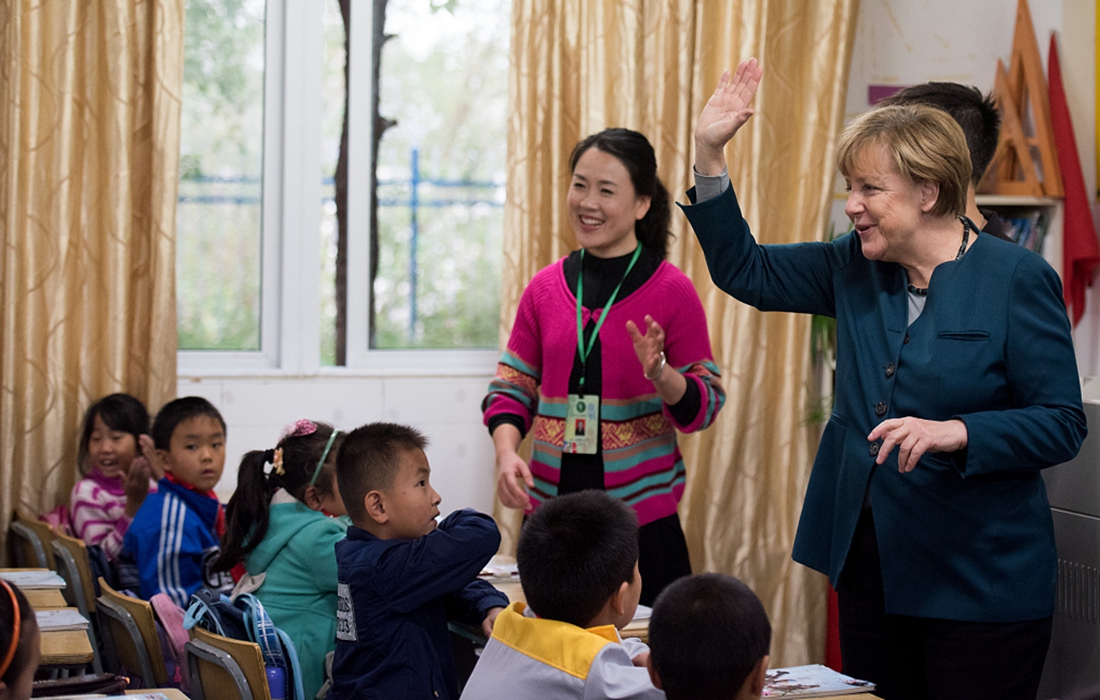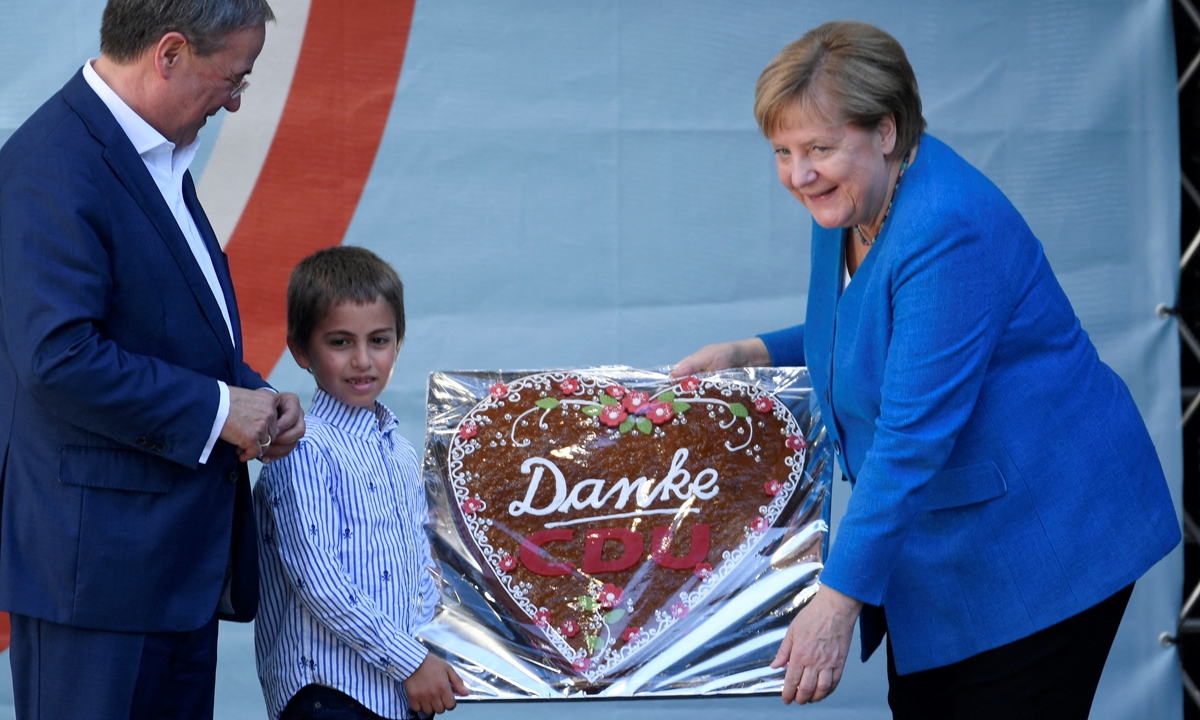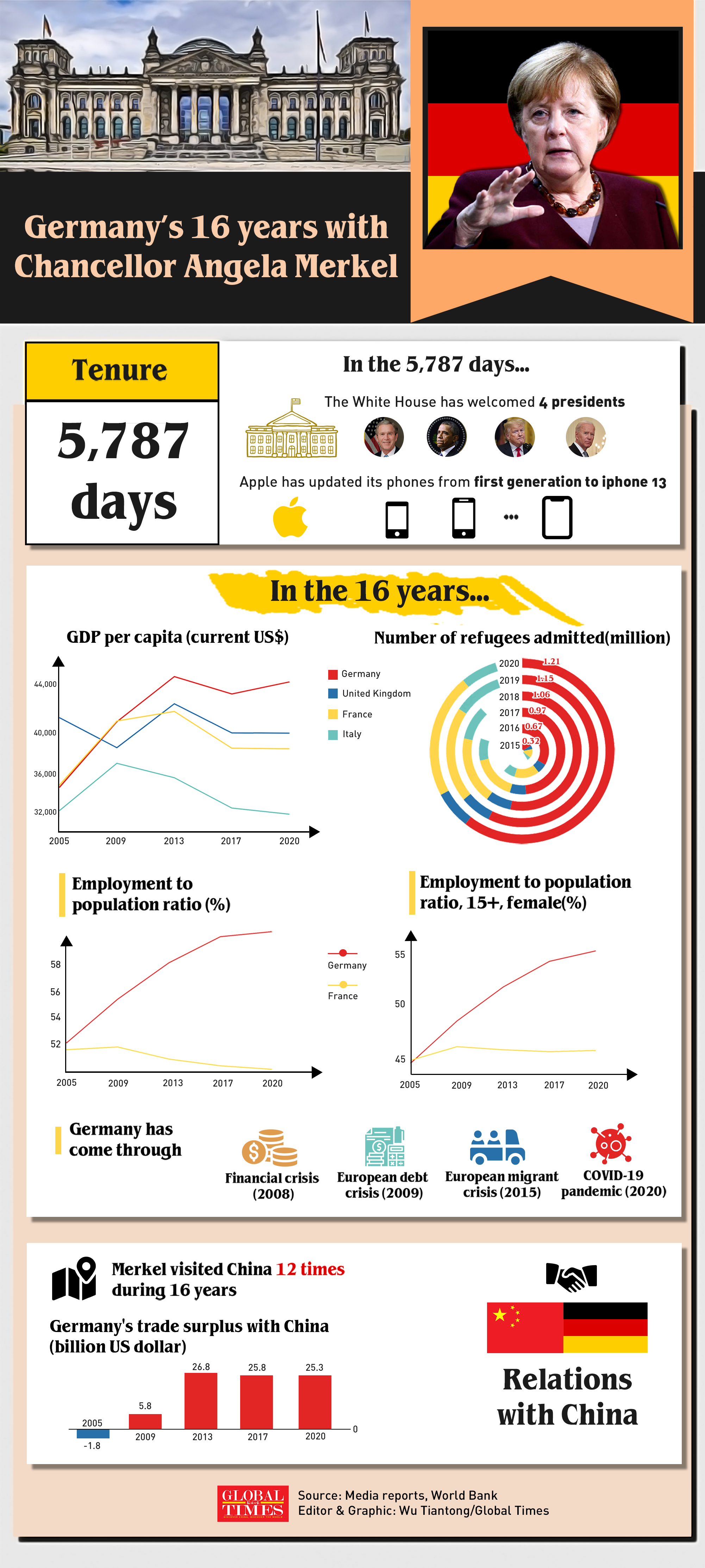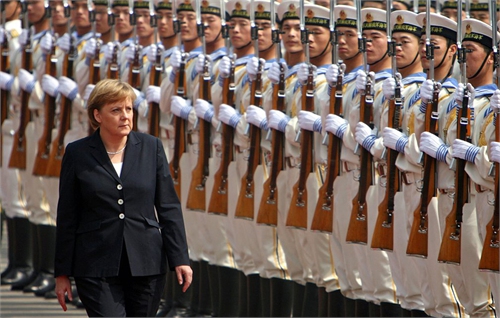China-Germany ties under Merkel a model for Europe, may briefly suffer after she leaves

German Chancellor Angela Merkel talks to children of Jinputao Primary School in Hefei, East China's Anhui Province on October 30, 2015. Photo: CFP
As German people's "Mutti (Mummy)," and Europe's "crisis manager," Angela Merkel is stepping down from the post she has held for 16 years, making her the country's second-longest-serving chancellor and the first chancellor to leave power of her own volition.
Days before her leaving, several global surveys of her were overwhelmingly positive, which the CNBC called "a feat not often achieved by departing global leaders."
She has been a mainstay in Europe, guiding the continent through the 2008 financial crisis and unprecedented waves of migration in 2015, withstanding challenges brought by Trump's tumultuous tenure, and leading the EU to walk steadily toward strategic independence and well balanced relations with China and the US, Chinese analysts said.
After tumbling at the first stage, it is during the Merkel-era that China-Germany relations gradually reached a healthy state with seeking a common ground while reserving differences, making China-Germany relations a fine model for bilateral relations between China and major Western countries, they noted.
There is no doubt that Merkel has left a great legacy of leadership, but her stepping down is also at a critical moment for Europe, which has plunged into a dilemma of refugees, an aging population, rampant far-right forces and being hit head-on by the US' constant betrayal, from the Afghan pullout to the AUKUS pact.
Europe is at a crucial intersection, and it has given rise to discussions on whether Merkel's exit leaves Europe with opportunities or in peril, whether there will be another Merkel that can lead Europe to fend off risks and resolve future crises and more importantly, chart a third way between Washington and Beijing.

German Chancellor Angela Merkel (R) is presented with a gingerbread heart with “Thank you CDU” during a campaign rally for Christian Democratic Union leader and chancellor candidate Armin Laschet (L) in Aachen, western Germany, on Saturday. Photo: AFP
China-Germany relations a fine model
Chinese analysts said Merkel's most important legacy lies in consolidating Germany's global influence and leading the EU to walk toward integration and strategic independence while tiding Germany and Europe through a cascade of crises.
Jiang Feng, a research fellow at Shanghai International Studies University, told the Global Times that Merkel's 16 years in power have greatly enhanced the influence and shaping of power of Germany and Europe on the world stage.
Merkel played an inseparable role in China and Europe together becoming the stabilizing force of the world amid the turbulent global pattern caused by the US, Jiang said.
Merkel's policies could be described as pursing stability, accuracy and changing with the times while not recklessly advancing on military and security, and her scientific decisions ensured the stability and development of Germany and the EU, and helped Europe resist Trump's pressure while seeking balance among major powers, Sun Keqin, a research fellow at the China Institutes of Contemporary International Relations, told the Global Times.
A new global study by Paris-based consulting firm Ipsos conducted online among nearly 20,000 adults across 28 countries on people's views about Merkel last week, showed that 53 percent of the respondents in 11 European countries agree that Germany has been a trustworthy partner for their country on European issues under Angela Merkel. Across 16 non-European countries, agreement is even higher, with 55 percent believing that Germany has been a reliable partner for their country on global issues.
In Western media reports, Merkel's attitude toward China triggered controversy. In the 16 years, no other Western leader has visited China as many times as Merkel -12 times in total.
Wolfram Adolphi, a German political scientist, who was head of the Berlin chapter of the Party of Democratic Socialism, a forerunner to the current Left Party, told the Global Times recently that he believed that Merkel, being forced to act under difficult international circumstances like the harsh changes in US foreign policy and very different economic, political and ideological interests inside Germany, had a successful tenure. Merkel held a certain balance which allowed for the development of bilateral relations with China in a sense of mutual advantage.
For Chinese scholars, Merkel went through a process of understanding China-Germany relations and China-Europe relations, and eventually formed a pragmatic and steady China policy, making China-Germany relations the most stable among bilateral relations between China and Western countries.
China and Germany got on track with true and practical cooperation during the Merkel era, and dozens of bilateral relations mechanisms ensured close bilateral cooperation when dealing with global governance and heated issues, He Zhigao, a research fellow with the Institute of European Studies from the Chinese Academy of Social Sciences, told the Global Times.
Cui Hongjian, director of the Department of European Studies, China Institute of International Studies, told the Global Times that China-Europe relations have been greatly developed in the Merkel era guided by China-Germany relations, which served as a stabilizer of China-Europe relations.
"China-Germany relations also set a fine example for bilateral relations between China and Western countries," Cui said.
Chinese analysts said that resolving crises one after another also needs a strong and stable leadership, especially facing major international changes and unprecedented public health crises.
Both China and Germany, with a stable government, firmly pushed for effective quarantine measures to control the COVID-19 pandemic despite some German residents protesting against it, unlike the US government which heavily focused on elections and personal interests, failing in their COVID-19 response, Sun said.
The Ipsos survey also signaled the important role of strong leadership, as four out of five adults on average across all countries surveyed agreed that the world needs strong leaders to solve global challenges, such as Merkel. And the agreement is the highest in China (90 percent), Australia (88 percent), and Russia (87 percent), the survey found.

Germany's 16 years with Chancellor Angela Merkel. Graphic: Wu Tiantong/GT
Post-Merkel era
Facing the challenges of economic recovery, refugees and rampant far-right forces and the US' betrayal, Europe's sense of strategic independence has been fully activated, but as for whether there will be another Merkel leading Europe through crises and charting a third way between China and the US, Chinese analysts said it would be very difficult to find.
"Merkel leaving is definitely bad news for Germany and the EU, and we cannot say there will never be another Merkel in Europe, but it will take at least three to five years," Zhao Junjie, a research fellow at the Chinese Academy of Social Sciences' Institute of European Studies, told the Global Times, noting that Merkel's strength lies in her rational thinking in how to balance issues between major powers to benefit the stability and development of the EU.
Only Germany and France could lead the EU toward strategic independence, but Emmanuel Macron was not sophisticated enough in dealing with international affairs and time is also needed for Merkel's successor in Germany, Zhao said.
Some Western media believed Europe in the post-Merkel era will lean toward the US and China-EU investment agreement may be impossible, but Zhao said major EU countries, which have been angered by the US' irresponsible withdrawal from Afghanistan and felt they were stabbed in the back after the US signed the AUKUS pact with the UK and Australia, will keep a distance from the US.
And the China-EU investment agreement was for both China and a dozen of EU countries, and EU countries will not let the European parliament kidnap their national interests, and therefore it will eventually be ratified, Zhao said.
As for China-Germany relations in the post-Merkel era, He said we hold a cautiously optimistic attitude. Her successor may not be as politically mature as her and there may be some changes in policies that may affect China-Germany ties. But due to the close cooperation on economic exchanges and shared views on the opposition of a unipolar world, China-Germany ties will eventually go back to the right, practical track.
Cui believed uncertainty in China-Germany relations will rise in the post-Merkel era, and in pushing for European integration, China may become the target for Germany to shift disputes with EU members.
But Merkel's China policy has become the mainstream China policy for Berlin, and her successor, no matter who, will modify policy based on Merkel's but will not completely overturn it.
"Merkel's China policy is built on the core of safeguarding Germany's interests, especially in the economic and trade field. It cannot simply be abandoned and no leader dares to pay such a price," Cui said.



